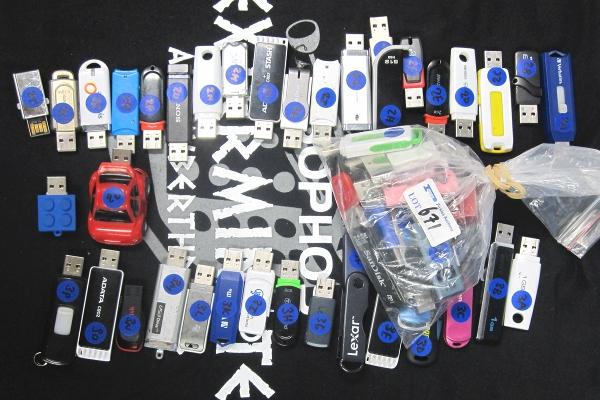
Lucky dip! Lost USB keys bought at NSW RailCorp's lost property auction yield personal data. (Photo: Sophos)
Lost USB memory keys make such rich and easy pickings for personal data that criminals must surely be onto this scam already. Their only risk is getting infected by the damn things.
In a study of 50 devices bought at the NSW RailCorp lost property auction in Sydney released today, Sophos found that none were encrypted or contained encrypted files, yet "many" contained personal or business information.
"We acquired these lawfully and now we've got them," Paul Ducklin, Sophos' head of technology for the Asia-Pacific region, told CSO Online.
Ducklin's lucky dip yielded lists of tax deductions, CVs and job applications, family photos and business data such as AutoCAD drawings, source code — and even the minutes of an activists' meeting.
"The good part is that we didn't find any obvious 'smoking guns'," Ducklin wrote in the report, "There were no visible plans for nuclear submarines, no insider trading tips, no credit card dumps, no criminal plots, and no US State Department cables dating back to the 1970s."
However two-thirds of the USB keys contained malware, mostly Mal/AutoInf-A autorun worms (16), Mal/Palevo-A (15), Mal/Inject-H (13), Mal/VB-AD (4) and others. The worst example had six different infections.
Ducklin wrote simple scripts on a netbook to take an image of each key without altering its data, check it for malware, and search for files. He chose to learn as little as possible yet still make the point.
Sophos didn't search for keywords across slack space or attempt to reconstruct deleted files. Nor did they search on the Spotlight indexing data on the nine keys that had clearly been used under OS X.
Imaging the keys was the slowest part, with data transfer speeds ranging from 7.5 megabytes per second (MBps) to 20MBps. Most were slower than the average hard drive.
"There wasn't any forensic art and science about this," Duckin said. Criminals could easily organise it on a mass scale.
"This could be done by someone who knew no more than how to open the lid of a laptop and insert USB keys," he said.
"You can image a key and then put it back. Apart from the fact that there are fingerprints on the key, or that it went missing for a while, no-one would know."
Contact Stilgherrian at Stil@stilgherrian.com or follow him on Twitter at @stilgherrian